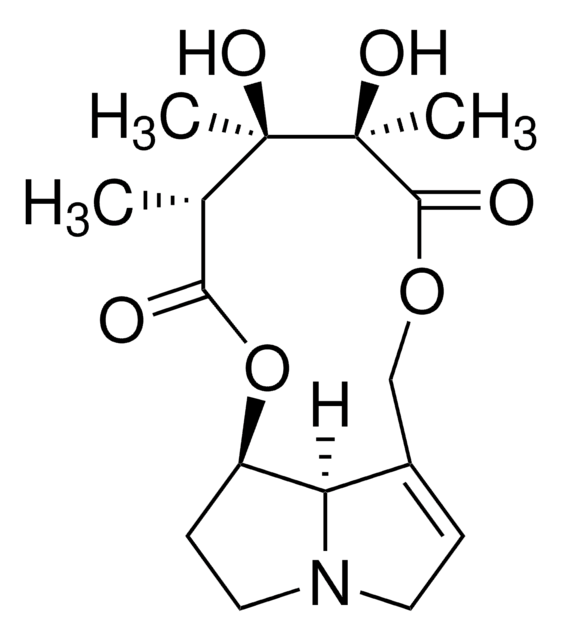M2265
1-Octanoyl-rac-glycerol
≥99%
Synonym(s):
Glyceryl 1-monooctanoate, 1-Capryloyl-rac-glycerol, Monocaprylin
Sign Into View Organizational & Contract Pricing
All Photos(3)
About This Item
Empirical Formula (Hill Notation):
C11H22O4
CAS Number:
Molecular Weight:
218.29
MDL number:
UNSPSC Code:
12352211
PubChem Substance ID:
NACRES:
NA.25
Recommended Products
Assay
≥99%
form
powder
functional group
ester
lipid type
neutral glycerides
shipped in
ambient
storage temp.
−20°C
SMILES string
CCCCCCCC(=O)OCC(O)CO
InChI
1S/C11H22O4/c1-2-3-4-5-6-7-11(14)15-9-10(13)8-12/h10,12-13H,2-9H2,1H3
InChI key
GHBFNMLVSPCDGN-UHFFFAOYSA-N
Application
- Molecular Simulations and Markov State Modeling of Quorum Sensing Regulators: Research revealed the inactive form of the quorum sensing regulator SdiA in Escherichia coli, offering insights into bacterial communication mechanisms that could be influenced by lipid-based signaling molecules such as 1-Octanoyl-rac-glycerol (Grabski et al., 2021).
Biochem/physiol Actions
Monocaprylin (1-octanoyl-rac-glycerol) is used as an antimicrobial monoglycerin with potential to treat bacteria D congolensis and campylobacter infections and to inactivate E. coli, Listeria and Salmonella on biosurfaces.
Storage Class Code
11 - Combustible Solids
WGK
WGK 3
Flash Point(F)
Not applicable
Flash Point(C)
Not applicable
Personal Protective Equipment
dust mask type N95 (US), Eyeshields, Gloves
Certificates of Analysis (COA)
Search for Certificates of Analysis (COA) by entering the products Lot/Batch Number. Lot and Batch Numbers can be found on a product’s label following the words ‘Lot’ or ‘Batch’.
Already Own This Product?
Find documentation for the products that you have recently purchased in the Document Library.
Customers Also Viewed
Su-sen Chang et al.
International journal of food microbiology, 144(1), 141-146 (2010-10-12)
Alfalfa and other seed sprouts have been implicated in several Escherichia coli O157:H7 and Salmonella spp. human illness outbreaks in the U.S. Continuing food safety issues with alfalfa seeds necessitate the need for discovery and use of novel and effective
Varun Garg et al.
European journal of pharmaceutical sciences : official journal of the European Federation for Pharmaceutical Sciences, 109, 297-315 (2017-08-27)
Development of self-nanoemulsifying drug delivery systems (SNEDDS) of polypeptide-k (PPK) is reported with the aim to achieve its oral delivery. Box-Behnken design (BBD) was adopted to develop and optimize the composition of SNEDDS. Oleoyl polyoxyl-6 glycerides (A), Tween 80 (B)
Preeti Wavikar et al.
Journal of pharmaceutical sciences, 106(12), 3613-3622 (2017-09-20)
Present investigation explores the potential of nanostructured lipid carriers (NLCs) for nose to brain delivery of rivastigmine (RV), which is further enhanced by incorporating into an in situ gelling system, increasing retention in nasal cavity. NLCs having particle size of
Dong Woo Yeom et al.
Oncotarget, 8(55), 94297-94316 (2017-12-08)
In order to improve the dissolution and oral bioavailability of valsartan (VST), and reduce the required volume for treatment, we previously formulated a supersaturable self-microemulsifying drug delivery system (SuSMEDDS) composed of VST (80 mg), Capmul
Abdulsalam M Kassem et al.
Journal of microencapsulation, 34(3), 319-333 (2017-05-10)
The objective of this study was to develop and optimise self-nanoemulsifying drug delivery system (SNEDDS) of atorvastatin calcium (ATC) for improving dissolution rate and eventually oral bioavailability. Ternary phase diagrams were constructed on basis of solubility and emulsification studies. The
Our team of scientists has experience in all areas of research including Life Science, Material Science, Chemical Synthesis, Chromatography, Analytical and many others.
Contact Technical Service









